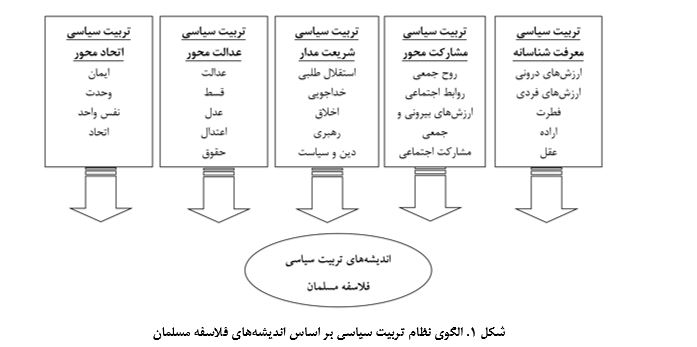The Model of Political Education from the Perspective of Muslim and Non-Muslim Thinkers
Keywords:
Political education, Martyr Motahari, social education , justice, political participationAbstract
The purpose of this study is to present a model of political education from the perspective of both Muslim and non-Muslim thinkers, emphasizing the philosophical views of Martyr Morteza Motahari and John Dewey concerning political education. The research method is qualitative, employing deductive content analysis. Using a descriptive-interpretive approach, the study analyzes the philosophical foundations of political education. The statistical population of this research includes the content analysis of all books and resources written on the topic of political education. The sampling method is purposive sampling. To examine validity, the criterion of credibility was used, and for reliability, the criterion of dependability was employed. The results of open or initial coding of the political education ideas of Muslim philosophers indicate that 38 initial concepts were extracted through open coding. After determining the open codes and axial categories, selective coding was performed. The findings revealed that the ideas of Islamic philosophers regarding political education are based on epistemological political education, participatory orientation, Sharia-oriented education, justice-centeredness, and unity-centeredness. Furthermore, the results of open or initial coding of the political education ideas of non-Muslim philosophers show that 43 initial concepts were obtained through open coding. After identifying the open codes and axial categories, selective coding was conducted, demonstrating that the political education thoughts of non-Muslim philosophers are based on awareness-raising, voluntarism, and social orientation. Overall, referencing these results can serve as a significant and effective step in explaining a model of political education within the education system so that students are educated with a focus on political values.
Downloads
References
Bandura A. Self-Efficacy Mechanism in Human Agency. American Psychologist. 2018;37:47-122. doi:
1037//0003-066X.37.2.122.
Elias JL. Philosophy of Education. Qom: Imam Khomeini Educational and Research Institute; 2016.
Eftekhari A, Mahjour H. A Model of Political Education from the Perspective of Martyr Motahari. Scientific Research
Quarterly of Islamic Revolution Approaches. 2016;10(36):77-98.
Norris P. Theories of Political Activism: New Challenges, New Opportunities. Oxford: Oxford University Press; 2019.
Salahshouri A, Yadollahi Far MJ, Khonakdar Tarsi M. Principles and Components of Political Education from Imam
Khomeini's Perspective. Scientific-Research Quarterly of Islamic Revolution Studies. 2012;2(5):111-26.
Alem A. Foundations of Political Science. Tehran: Ney Publishing; 2015.
Bashiriyeh H. Political Sociology. Tehran: Ney Publishing; 2015.
Motahari M. Man and Faith. Tehran: Sadra; 2000.
Motahari M. Man and Destiny. Tehran: Sadra; 2008.
Motahari M. Innate Nature (Fitra). Tehran: Sadra; 2009.
Motahari M. The Future of the Islamic Revolution. Tehran: Sadra; 2010.
Motahari M. Twenty Discourses. Tehran: Sadra; 2010.
Motahari M. Fifteen Discourses. Tehran: Sadra; 2010.
Motahari M. Divine Aid to Humanity. Tehran: Sadra; 2011.
Motahari M. Notes. Tehran: Sadra; 2011.
Motahari M. Education and Training in Islam. Tehran: Sadra; 2013.
Motahari M. A Journey through Nahj al-Balagha. Tehran: Sadra Publications; 2018.
Dewey J. School and Student. Tehran: Safi Ali Shah Publications; 2011.
Dewey J. Experience and Education. Tehran: Ketab Publishing; 2018.
Shariatmadari A. Philosophy of Education. Tehran: Amir Kabir Publishing; 2019.
Pourfard M. Political Education from the Perspective of Martyrs Motahari and Beheshti. Path of Education.
(5):123-54.
Samadi S. Education from John Dewey's Perspective: Teachers' Cottage; 2009.

Downloads
Published
Submitted
Revised
Accepted
Issue
Section
License
Copyright (c) 2024 Journal of Study and Innovation in Education and Development

This work is licensed under a Creative Commons Attribution-NonCommercial 4.0 International License.










